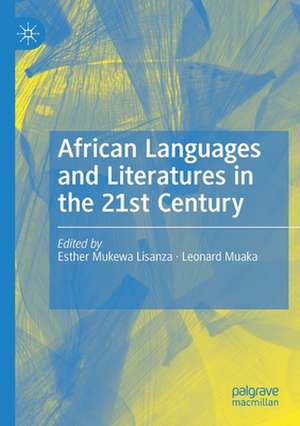African Languages and Literatures in the 21st Century
Editat de Esther Mukewa Lisanza, Leonard Muakaen Limba Engleză Paperback – 16 aug 2020
| Toate formatele și edițiile | Preț | Express |
|---|---|---|
| Paperback (1) | 581.33 lei 6-8 săpt. | |
| Springer International Publishing – 16 aug 2020 | 581.33 lei 6-8 săpt. | |
| Hardback (1) | 726.37 lei 6-8 săpt. | |
| Springer International Publishing – 16 aug 2019 | 726.37 lei 6-8 săpt. |
Preț: 581.33 lei
Preț vechi: 683.92 lei
-15% Nou
Puncte Express: 872
Preț estimativ în valută:
111.25€ • 115.49$ • 92.76£
111.25€ • 115.49$ • 92.76£
Carte tipărită la comandă
Livrare economică 22 martie-05 aprilie
Preluare comenzi: 021 569.72.76
Specificații
ISBN-13: 9783030234812
ISBN-10: 3030234819
Pagini: 248
Ilustrații: XI, 248 p. 1 illus.
Dimensiuni: 148 x 210 x 23 mm
Greutate: 0.35 kg
Ediția:1st ed. 2020
Editura: Springer International Publishing
Colecția Palgrave Macmillan
Locul publicării:Cham, Switzerland
ISBN-10: 3030234819
Pagini: 248
Ilustrații: XI, 248 p. 1 illus.
Dimensiuni: 148 x 210 x 23 mm
Greutate: 0.35 kg
Ediția:1st ed. 2020
Editura: Springer International Publishing
Colecția Palgrave Macmillan
Locul publicării:Cham, Switzerland
Cuprins
Chapter 1: Introduction (Esther Mukewa Lisanza and Leonard Muaka).- SECTION 1: Language and Education.- Chapter 2: 21st Century North Africa: Nationalism, Globalization and the Struggle for Tamazight Language (Ali Alalou).- Chapter 3: Appropriation of Orature for Pedagogy by Early Yorùbá Christians (Damola Adesina and Sola Olorunyomi).- Chapter 4: Swahili Learning in the United States: What Does it Mean? (Esther Mukewa Lisanza).- Chapter 5: Learning that Brings Joy in an African Language Class: The Power of Reflection and Service Learning (Dainess Maganda).- Chapter 6: Linguistic Commodification and Africa’s Linguistic Identities: Creating a Nexus! (Leonard Muaka).- SECTION 2: Language and Literatures.- Chapter 7: Voicing the Silenced Through African Tongues: An Examination of Moolaadé and Tumaini (Rose Sau Lugano).- Chapter 8: Racism and Identity crisis of a Muslim immigrant in Ahmed’s Mhanga Nafsi Yangu (Mohamed Mwamzandi).- Chapter 9: An Examination of Okot P’ Bitek’s Song of Lawino as a Mega Metaphor for the African Indigenous Languages (Martha Michieka).- Chapter 10: Black-Islamic Feminism in 21st Century Senegalese Women’s Pop Songs (Samba Camara).- Chapter 11: Conclusion (Leonard Muaka and Esther Mukewa Lisanza).
Notă biografică
Esther Mukewa Lisanza is Assistant Professor in the Department of African Studies at Howard University, USA. She holds a Ph.D. in language and literacy from the University of Illinois Urbana-Champaign, USA. Her research and publications centre on language and literacy development, politics of language in education, African education, and women empowerment in Africa.
Leonard Muaka is an Associate Professor in the Department of World Languages and Cultures at Howard University, USA. He holds a Ph.D. in linguistics from the University of Illinois Urbana-Champaign, USA. He has taught in Kenya, Mexico and USA, and his research focuses on youth language, language and identity, political language, and multilingualism.
Leonard Muaka is an Associate Professor in the Department of World Languages and Cultures at Howard University, USA. He holds a Ph.D. in linguistics from the University of Illinois Urbana-Champaign, USA. He has taught in Kenya, Mexico and USA, and his research focuses on youth language, language and identity, political language, and multilingualism.
Textul de pe ultima copertă
"The editors present a fascinating and original contribution to the field, and a wide range of perspectives on African languages, literatures and cultures."
-- Kizitus Mpoche, University of Douala, Cameroon
Esther Mukewa Lisanza is Assistant Professor in the Department of African Studies at Howard University, USA. She holds a Ph.D. in language and literacy from the University of Illinois Urbana-Champaign, USA. Her research and publications centre on language and literacy development, politics of language in education, African education, and women empowerment in Africa.
Leonard Muaka is an Associate Professor in the Department of World Languages and Cultures at Howard University, USA. He holds a Ph.D. in linguistics from the University of Illinois Urbana-Champaign, USA. He has taught in Kenya, Mexico and USA, and his research focuses on youth language, language and identity, political language, and multilingualism.
Caracteristici
Explores the interplay of language, literature, and education in Africa and beyond Seeks to bridge the gap between the African continent and the rest of the world, including diaspora cultures and literatures Examines multilingual and multicultural Africa in the context of 21st-century neo-colonialism and globalization Foregrounds marginalized groups, female empowerment and immigration issues.
